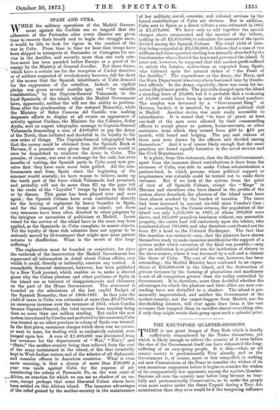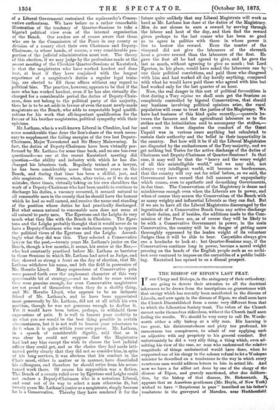THE KNUTSFORD QUARTER-SESSIONS.
THERE is one great danger of Tory Rule which is hardly sufficiently remembered by the Tories themselves, yet which is likely enough to relieve the country of it even before the sins of the Government itself can have exhausted the long- suffering of an easy-going people. It is this,—that, as all county society is predominantly Tory already, and as the Government is, of coarse, more or less compelled, in making out new Commissions of the Peace to consider the wishes of its own numerous supporters before it begins to consider the wishes of its comparatively few opponents among the squires, Quarter- Sessions all over the country may before long become so fear- fully and preternaturally Conservative, as to make the people even more restive under the Great Unpaid during a Tory Ad- ministration than they ever would be if the tempering influence
of a Liberal Government restrained the squirearchy's Conser- vative enthusiasm. We have before us a rather remarkable illustration of the tendency of Quarter-Sessions to take a bigoted political view even of the internal organisation of the Bench. Our readers are of course aware that those who are in the Commission of the Peace in any county or division of a county elect their own Chairman and Deputy- Chairman, in whose hands, of course, a very considerable pro- portion of the judicial administration must rest. The theory of this election, if we may judge by the professions made at the recent meeting of the Cheshire Quarter-Sessions at Knutsford, is that the magistrates who have worked hardest and done best, at least if they have conjoined with the longest experience of a magistrate's duties a regular legal train- ing, are elected to fill these offices without any regard to political bias. The practice, however, appears to be that if the man who has worked hardest, even if he has also virtually dis- charged for a considerable period the duties of Deputy-Chair- man, does not belong to the political party of the majority, then he is to be set aside in favour of even the most newly-made magistrate on the Bench, who adds to respectable legal qualifi- cations for his work that all-important qualification for the favour of his brother magistrates, political sympathy with their opinions.
Mr. Latham, who is a well-known Liberal in Cheshire, had for some oonsiderable time done the lion's share of the work neces- sary to supplement the failing energies of the two last Deputy- Chairmen, Major Townshend and Sir Henry Mainwaring. In fact, the duties of Deputy-Chairman have been virtually per- formed-by Mr. Latham for some time back, and no one has ever questioned—no one at the recent Knutsford meeting did question—the ability and industry with which he has dis- charged his laborious task. Regularly trained as a lawyer, he has been considerably more than twenty years on the Bench, and during that time has been a skilful, just, and able magistrate. Of course, when after twice, or if we do not mistake, three times, virtually taking on his own shoulders the work of a Deputy-Chairman who had been unable to continue to discharge his duties, a vacancy occurred, it seemed natural to all reasonable men in the county that he should have the honour which he had so well earned, and receive the name and standing of the position whose duties he had practically discharged. But what seems natural to reasonable men does not seem at all natural to party men. The Egertons and the Leighs do very much what they like with the Bench in Cheshire. The Eger- tons and the Leighs probably thought that it would never do to have a Deputy-Chairman who was audacious enough to oppose the political views of the Egertons and the Leighs. Accord- ingly what they did was this. They selected a Conservative lawyer for the post,—twenty years Mr. Latham's junior on the Bench, though a few months, it seems, his senior at the Bar,— who had constantly practised before Mr. Latham as barrister in those Sessions in which Mr. Latham had acted as Judge, and they showed so strong a front on the day of election, that Mr. Latham withdrew his name, and left the field in possession of Mr. Horatio Lloyd. Many expressions of Conservative pain were poured forth over the unpleasant character of this very questionable bit of strategy,—and no doubt to some extent they were genuine enough, for even Conservative magistrates are not proud of themselves when they do a shabby thing, and Mr. Horatio Lloyd, who appears to be an intimate friend of Mr. Latham's, and to have been appreciated most generously by Mr. Latham, did not at all relish his own position, though he was not generous enough to decline it. Yet it would have been better, perhaps, to withhold these • expressions of pain. It is well to lament your inability to do what you see would be the best thing possible in certain circumstances, but it is not well to lament your reluctance to do it when it is quite within your own power. Mr. Latham, in a speech of considerable dignity, said that as it was clear he could not suppose that the Magistrates had had any bias except the wish to choose the best judicial officer they could get, and as the choice they had made inti- mated pretty clearly that they did not so consider him, in spite of his Icing services, it was obvious that his conduct in the Chair must, either in matter or in manner, have dissatisfied his colleagues, and therefore he should retire from his accus- tomed work there. Of course his supposition was a fiction. The Bench of a county ruled over by Egertons and Leighs could not endure a Deputy-Chairman who is a notorious Liberal, and went out of its way to select a man otherwise fit, but twenty years Mr. Latham's junior as a magistrate, simply because he is a Conservative. Thereby they have rendered it for the
future quite unlikely that any liberal Magistrate will work as hard as Mr. Latham has done at the duties of the Magistracy. Men do not choose to earn a reward by serving through the labour and heat of the day, and then find the reward given perhaps to the last comer who has been so good as to agree in politics with those in whose power it lies to bestow the reward. Even the master of the vineyard did not give the labourers of the eleventh hour a greater reward than the labourers of the first. He gave the first all he had agreed to give, and he gave the last as much, without agreeing to give so much ; but Lord Egerton, in his place, would have asked the labourers one by - one their political convictions, and paid those who disagreed with him and had worked all day hardly anything, compared with what he would have paid those who agreed with him but had worked only for the last quarter of an hour. Now, the real danger in this sort of political favouritism is that during a Tory regime we shall soon get the Sessions so completely controlled by bigoted Conservatives, that should any business involving political opinions arise, the rural population will cease to trust the justice a the Magistracy. We have had business of this kind quite recently,—quarrels be- tween the farmers and the agricultural labourers as to the strikes and the intimidation said to accompany the strikes,— and even in those disputes the conduct of the Gnat Unpaid was in various cases anything but calculated to sustain their authority and the belief in their impartiality in the country. But how will it be if all the Liberal Magistrates are disgusted by the exclusiveness of the Tory majority, and we get nothing but Tories for the active discharge of the duties of Chainnan and Deputy-Chairman of Quarter-Sessions In that case, it may well be that the "heavy and the weary weight of all this unintelligible world," and we may add, not always very intelligent world, will become so burdensome, that the country will cry out for relief before, as we said, the Government have earned that full measure of unpopulaety which comes, even to apathetic and do-nothing Governments, in due time. The Conservatism of the Magistracy is dense and mischievous enough even when the Liberals are in power, and when of course they season the Conservatism of the Bench with as many weighty and influential Liberals as they can find. But if we are to have all the Liberal Magistrates discouraged by the ingratitude of a Conservative Bench from any active discharge of their duties, and if besides, the additions made to the Com- mission of the Peace are, as of course they will be likely to be with a Conservative Government in power, in the main Conservative, the country will be in danger of getting more thoroughly oppressed by the leaden weight of its volunteer Judges than it will be able to bear. Caryatides always give one a headache to look at; but Quarter-Sessions may, if the Conservatives continue long in power, become a moral weight pressing on the heads of the English people such as no archi- tect ever ventured to impose on the caryatides of a public build- ing. Knutsford has opened to us a dismal prospeot.



































 Previous page
Previous page